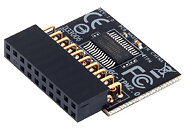- Joined
- Oct 9, 2007
- Messages
- 47,618 (7.44/day)
- Location
- Dublin, Ireland
| System Name | RBMK-1000 |
|---|---|
| Processor | AMD Ryzen 7 5700G |
| Motherboard | Gigabyte B550 AORUS Elite V2 |
| Cooling | DeepCool Gammax L240 V2 |
| Memory | 2x 16GB DDR4-3200 |
| Video Card(s) | Galax RTX 4070 Ti EX |
| Storage | Samsung 990 1TB |
| Display(s) | BenQ 1440p 60 Hz 27-inch |
| Case | Corsair Carbide 100R |
| Audio Device(s) | ASUS SupremeFX S1220A |
| Power Supply | Cooler Master MWE Gold 650W |
| Mouse | ASUS ROG Strix Impact |
| Keyboard | Gamdias Hermes E2 |
| Software | Windows 11 Pro |
Does it take ages for the taskbar calendar and notification center to load on your Windows 11 PC powered by an AMD Ryzen processor? Notice random stutters in performance? Chances are, the lag is caused not due to user-interface bugs by Microsoft, but hardware. AMD discovered that certain Ryzen-powered Windows 11 and Windows 10 PCs experience intermittent performance stutters when running with fTPM (firmware TPM) enabled.
The performance stutter is caused due to background memory transactions between Windows and the fTPM, to authenticate an action, as the fTPM serves the function of a hardware root of trust. Since the fTPM is part of the UEFI firmware that resides on the SPI flash EEPROM chip, the performance stutter is caused due to fTPM-related memory transactions with this chip.

AMD issued an immediate workaround, as well as announced that it's working on a fix. As a workaround, you can switch from fTPM to a discrete TPM module (or dTPM), which uses the TPM 2.0 header on your motherboard. dTPMs such as the one pictured above, have been selling on Amazon for anywhere between $50-100. Be absolutely sure to disable Bitlocker before switching between fTPM and dTPM, if you have it enabled. Or you could just wait for AMD's fix, which will be distributed by motherboard or OEM vendors, as UEFI firmware updates.
AMD expects firmware updates with the fix to start coming out around May 2022. These will use the AGESA V2 ComboPI 1.2.0.7 (or later) microcode. The latest version of AGESA in distribution is 1.2.0.6b.
View at TechPowerUp Main Site | Source
The performance stutter is caused due to background memory transactions between Windows and the fTPM, to authenticate an action, as the fTPM serves the function of a hardware root of trust. Since the fTPM is part of the UEFI firmware that resides on the SPI flash EEPROM chip, the performance stutter is caused due to fTPM-related memory transactions with this chip.

AMD issued an immediate workaround, as well as announced that it's working on a fix. As a workaround, you can switch from fTPM to a discrete TPM module (or dTPM), which uses the TPM 2.0 header on your motherboard. dTPMs such as the one pictured above, have been selling on Amazon for anywhere between $50-100. Be absolutely sure to disable Bitlocker before switching between fTPM and dTPM, if you have it enabled. Or you could just wait for AMD's fix, which will be distributed by motherboard or OEM vendors, as UEFI firmware updates.
AMD expects firmware updates with the fix to start coming out around May 2022. These will use the AGESA V2 ComboPI 1.2.0.7 (or later) microcode. The latest version of AGESA in distribution is 1.2.0.6b.
View at TechPowerUp Main Site | Source







